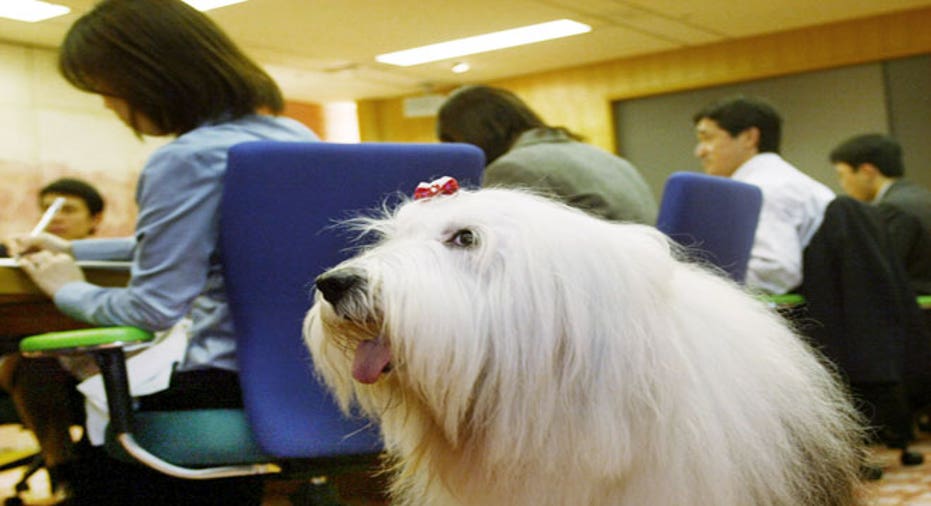Wildest Pet Insurance Claims: Dog vs. Onion Rings, Cat in Wash Cycle

Mix the family hound with a bag of frozen onion rings and you get a recipe for one sick puppy -- and the winner of the 2013 Hambone Award for the most unusual pet insurance claim of the year.
Veterinary Pet Insurance's annual contest is now in its fifth year and is named after an ambitious dog that ate a thigh-sized holiday ham while stuck in a walk-in fridge. Top honors this year go to Winnie, a mixed breed canine belonging to the Bowser family of Barnstable, Mass. Winnie's odyssey began when the Bowsers, rushing out of the house to pick up their daughter after putting away groceries, accidentally left a two-pound bag of onion rings in the kitchen.
"When we returned home, we had a very guilty-looking dog and an empty bag on the floor," recalls Kyle Bowser, pictured with Winnie at right.
Not a big deal, the Bowsers thought, Winnie may get a little queasy is all. But after Kyle's husband posted the story and a photo of Winnie on Facebook, a friend told them that onions and dogs don't get along. That led to some research, which led to a trip to the vet.
"I did some quick investigating and found out that onions aren't just bad for dogs, they are extremely toxic and can cause anemia," Kyle said in a press statement. "After reading that, I immediately called the Pet Poison Helpline, and they instructed me to take Winnie to the veterinarian."
After clearing Winnie's stomach, the vet fed her charcoal to absorb toxins. Still concerned that the onion rings could cause anemia, tests were ordered to see if Winnie's blood cells had been compromised. The tests were negative.
A good outcome, but Carol McConnell, Veterinary Pet Insurance's (VPI) vice president and chief veterinary medical officer, warns that onions can be dangerous when eaten by cats and dogs.
"Onion ingestion can be extremely harmful because the vegetable contains thiosulphate, an ingredient that is toxic to cats and dogs," McConnell said in a press statement. "Onion poisoning disrupts the pet's red blood cells circulating the body which may lead to hemolytic anemia. In extreme cases, the pet may need a blood transfusion."
Adam Fell, a VPI spokesman, says Winnie's tale was recently picked by more than 6,000 visitors to its website from about 1.1 million of the Brea, Calif.-based company's pet health insurance claims. Fell added that the Hyannis Animal Hospital in Yarmouth, Mass., where Winnie was treated, will receive $10,000 from the Veterinary Care Foundation to treat pets owned by people unable to afford care.
Mixing felines with your darks in the washer
Second place went to Natasha, a Siberian Forest cat from Oakland, Calif., who spent 35 minutes trapped in a washing machine, enduring a full wash cycle. "My roommate was loading his laundry and left the lid to the washing machine open while he went to the next room to grab more clothes," her owner Daryl Humdy said in a press statement. "He came back, threw his clothes in, and shut the lid to the washing machine without realizing that Natasha had jumped into it while he had been away."
Natasha was treated for shock and hypothermia, but survived the ordeal without any injuries. Natasha is fine these days -- she remains curious about most things, but keeps her distance from the washing machine.
Pet insurance basics
Besides VPI, several companies offer pet health insurance, including Healthy Paws, PetPlan, 24PetWatch, Embrace and Trupanion. Most sell similar protection. VPI, for example, offers a comprehensive plan for dogs that costs $25 to $35 a month. The same coverage for cats is $15 to $22 a month, with both paying a limit of $14,000 in vet expenses a year. VPI's basic "economical" coverage is $19 to $27 a month for dogs and $12 to $17 for cats. The maximum benefit for the economical plan is $7,000, says Fell.
But, as with other pet insurers, there are restrictions. VPI doesn't cover animals age 10 or older and won't reimburse for "elective procedures, congenital conditions, pet foods, grooming, behavioral problems and pre-existing conditions," according to the company's website.
Pets and homeowner liability
Dogs can be loyal, affectionate companions -- they can also bite people. In fact, dog-bite liability claims in 2011 comprised more than one-third of all homeowners insurance liability claims. This cost insurers about $479 million in 2011, up 16 percent from the previous year, according to the Insurance Information Institute (III). The average cost of a dog-bite insurance claim was $29,396 in 2011, according to the III.
Farmers Insurance, for instance, recently began eliminating homeowners liability coverage for dog-bite claims involving pit bulls, Rottweilers and wolf-dog hybrids. Farmers isn't canceling policies, but it does want clients who own these breeds to sign exclusion coverage waivers. Policies won't be renewed without the waivers.
Similar to Farmers, other home insurers won't include certain breeds in policies and requires customers to sign a waiver making them responsible for any lawsuits or health care costs connected to their dog's behavior.
Other insurers will ask you questions about your dog's history and will consider coverage on a case-by-case basis. State Farm is one example: Though the company paid more than $109 million as a result of nearly 3,800 dog-bite claims in 2011, State Farm does not refuse insurance based on the breed of a customer's dog.
The original article can be found at Insurance.com:Wildest pet insurance claims: Dog versus onion rings, cat in wash cycle



















